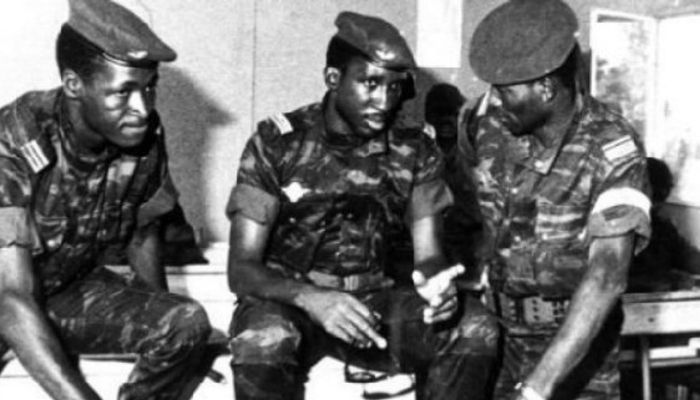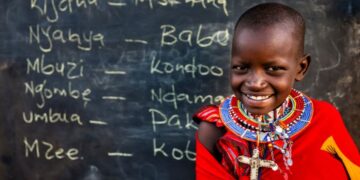Thomas Sankara and Blaise Compaore’s story is considered to be one of the worst betrayals in African history. They rose to a position of power in 1983, with Sankara being the president and Compaore his deputy.
So how did this once beautiful friendship turn sour? Apparently, Compaore got greedy for power and decided to put a knife to the back of Sankara, whose reformations earned him the nickname Che Guevera of Africa.
Though Compaore did not hesitate to take over Sankara’s position after a bloody coup in 1987, not many were impressed by his methods nor his position, and for the next couple of years, his life and legacy were in the shadow of one of Africa’s revolutionary leaders. He was convicted in 2021.
Considering that political betrayals have been rife throughout History, this is arguably the worst one in Africa.
Thomas Sankara and Blaise Compaore Started as Friends

Sankara and Compoare were best friends even before they became national figures. They first met at the beginning of their military career. Eventually, they became so close that Compoare became like a son to Sankara’s father when he lost his parents.
When Sankara seized power through a coup in 1983, he chose his right-hand man, Compoare, to be his deputy to help him set his revolutionary ideas in motion. While many, especially the common people, saw in him a savior, others, especially within the military, saw it differently.
Compaore wanted to be in Power Rather than Answer to Sankara
Among those dissatisfied with Sankara’s power was his closest friend and deputy, Blaise Compaore. At some point, things became so heated between the two friends that Sankara is said to have feared Compaore would act against him in the National Revolutionary Council. These concerns were revealed by Rawlings, who had received Campaore days before the gruesome events that would lead to one of the worst betrayals in African History.
Compaore had masterminded the coup d’etat, which was carried out on October 15, 1987. The ill-fated event was carried out while Blaise was ‘away on official duty. The revolutionary leader was shot seven times while en route to a meeting of the National Revolutionary Council, but he and 12 others present never survived the attack.
As if this was not enough, Sankara’s body was quickly buried in an unmarked grave while his young wife, Mariam, and two children fled the country. Following this, Compoare, who had denied any involvement with his friend’s death, soon took over power and started changing some of the policies introduced by Sankara.
Many Reactions Trailed Sankara’s Death
The impact of his leadership was felt beyond the boundaries of Burkina Faso, and here is why.
He had pursued aggressive pan-African policies that drew backlash from those opposing him while the underdogs saw a vision of hope in him. Unsurprising, some soldiers put up resistance after his death. Also, many never saw Campaore’s government as just one. Few men took things too far to prove this.
One of such is Ghana’s Rawlings, a close friend of the deposed leader who refused to pose for a photograph with Campaore. Rawlings revealed he was bitter and angry toward Sankara’s death, and his testimonial will be one of the turning points in the investigation, as we shall see.
Nigerian late Afro musician Fela Kuti, who is known for thought-provoking music, is said to have abused Compaore for his role in Sankara’s death. The Coffin for Head of State crooner staunchly believed in Sankara’s revolutionary ideas and policies.
Compaore was Handed a Life Sentence for the Killing of Sankara
During his rule, Compaore proved to be a strongman as he clamped down on the true circumstances of events leading up to the killing of the then 33-year-old Thomas Sankara. There were many speculations for the 27 years of his rule until he was deposed by a popular uprising and forced to flee to Ivory Coast in October 2014.
Despite this victory, closure was needed to restore this sad bit of history. Sankara’s widow had accused France of having a hand in her husband’s death, and in 2017, the Burkina Faso government asked for official records of the events from the French government.
Compaore and 14 others were tried and found guilty by a military court in April 2021. Interestingly, the trial was paused due to a coup that ousted then-President Roch Marc Christian Kabore. The coup, which was a Jihadist encroachment, was soon repelled, and Paul-Henri Sandaogo Damiba restored the constitution of the country.
Subsequently, they resumed the trial. The gruesome details of how Sankara was shot seven times alongside 12 others were made public during a six-month trial. Initially, the prosecutors had pushed for a 30-year sentence for the former president, who was tried in absentia. Since then, the former Burkinabe dictator got served what he had served, and in his case, many welcomed this as justice for a demised man who only dreamt of seeing his country become the actual ‘land of upright people.’
See Also: African Countries And Their Capitals, Independence, And Currency
Compaore Apologized for the Part He Played in the Killing Sankara
Since his conviction, Compaore wants to make peace with a past that should have never happened. Unsurprisingly, he has apologized for his role in the killing of his friend and leader. According to a statement read by a government spokesman, Campoare
‘…accepted responsibility for, and regret from the bottom of my heart, all the suffering and tragedies experienced by all victims during my terms as leader of the country and ask their families to grant me their forgiveness’
Compoare returned to the country for several days when Damiba invited him on the grounds of National Reconciliation. Based on this, Compoare was not arrested, leading to a public outcry over what many considered rewarding impunity. Considering the political turmoil that the country had experienced, many were not satisfied.




















